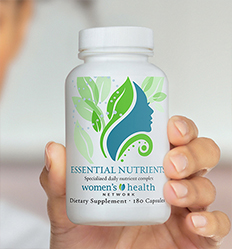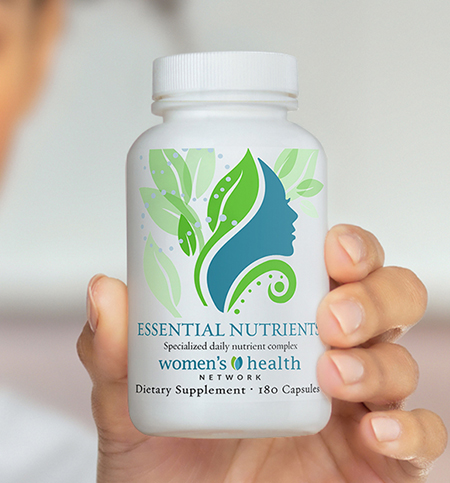Your brain is always hungry and you need to feed it well, especially as the years go by.
In a perfect world, the food you eat would give your brain what it needs to keep running the entire show. But even under ideal conditions, your brain chews through a lot of energy every day just to keep you alive — up to 25% of your total calories go to feeding your brain.

But calories aren’t the whole story. You want to be able to think and focus and remember too, in addition to merely surviving. Well then, you have to keep the high quality nutrition pouring in day after day. You know about eating a Mediterranean diet (veggies, fish, legumes and whole grains) and you do your level best to drink water (half your body weight in ounces every day). That’s all good.
But no matter what you’re eating, you could be doing better to empower your brain. And it’s a lot simpler than you might imagine.

Nutrients that support brain health
Nutrient deficiencies happen to the best of us, even while we’re eating great diets. Vitamins and supplements can fill the gap. The good news: you don’t need to take mega-doses of anything. However, you do need to look for specific ingredients and forms. Otherwise, your body might not be able to use the nutrients.
Here are some best bets for boosting your brain power.
Vitamin D
Vitamin D is a superstar nutrient that benefits your brain, but also your bones, heart, immune function and more. Your body needs sun exposure every day to make any Vitamin D at all. But can you get enough Vitamin D every day to maintain the level you need circulating in your blood? Probably not: up to 75% of Americans appear to be Vitamin D deficient. Low Vitamin D is common in patients with dementia and memory loss, as well as those suffering with multiple sclerosis.
Food sources of Vitamin D include egg yolks, sardines, beef liver and shiitake mushrooms. However, you want a steady, consistent level of Vitamin D every day, rather than have it jumping up and down according to the food you eat or don’t eat. Be honest: just how much beef liver are you prepared to eat every day? Taking a quality Vitamin D3 supplement daily is as simple as it gets and takes out all the guesswork.
B vitamins
Good, regular levels of B vitamins (B6, B9, B12 and others) are 100% essential for even the most basic brain health. You can get some B vitamins in everyday foods like chicken, eggs, dairy and leafy greens. However, it gets harder and harder to absorb B12 as we age, so getting it from diet alone may not be enough. And a huge chunk of the population — as much as 50% — with a certain genetic makeup can’t absorb most kinds of B9 (folate) well — or at all. To supplement, look for a quality multivitamin containing the Vitamin B complex, with the maximum safe amount of B12.
Flavonoids
Flavonoids are the plant chemicals that give many fruits and vegetables their vivid colors. These everyday nutrients have giant potential to help, and safeguard, your brain. The polyphenolic compounds in flavonoids have antioxidant and anti-inflammatory effects, and research shows they can enhance cognition and help protect neurons. Flavonoids are easy enough to find in foods — even the cocoa in chocolate contains them!
Omega-3 fatty acids
Essential fatty acids found in fish oil have some good brain support research behind them. Maybe you want to see if fish oil will improve your brain function. But what if you don’t like fish? Even if you dine on salmon once a week, it will never be enough to provide the therapeutic levels that the studies are based on. For the sake of your aging brain, get yourself a high quality Omega-3 supplement and take it daily.
Curcumin
An absorbable version of curcumin, a potent anti-inflammatory compound found in turmeric, is beneficial for brain health due to its ability to cross the blood-brain barrier and exert neuroprotective effects. Its antioxidant properties also aid in neutralizing harmful free radicals, further protecting brain cells from oxidative damage.
Quercitin
Similarly, quercetin, a natural antioxidant found in various fruits and vegetables, including onions and apples, provides neuroprotection by reducing inflammation and oxidative stress in the brain. Its anti-inflammatory effects may help alleviate symptoms of cognitive decline and improve overall brain function.
Green tea
Green tea possesses powerful antioxidant and anti-inflammatory properties that can support brain health. Regular consumption of green tea has been associated with a reduced risk of age-related cognitive decline and a lower incidence of neurodegenerative disorders. Catechins found in green tea are believed to enhance brain function, promote neurogenesis and protect neurons from damage, contributing to improved cognitive performance and overall brain health.
Our tips for good brain function as you age
As you get older, brain-function problems become more significant, and will make your life harder and less enjoyable. That’s no way to enjoy your third act in life!
Get yourself a basic brain health supplement and take it regularly. (It can’t help if you just take it now and then.) Give it at least 6 months before you decide whether it’s helping you. Nourishing your brain with supplements takes just seconds a day, and the basic nutrients aren’t expensive.
We think you’ll notice some improvements in how you think and remember. And if you complement your supplementation with a few commonsense lifestyle steps, you may see an even bigger difference.
- https://www.scientificamerican.com/article/vitamin-d-deficiency-united-states/
- https://www.livestrong.com/article/492244-what-are-the-health-benefits-of-flavonoids/
- Valentina Socci, Daniela Tempesta, Giovambattista Desideri, Luigi De Gennaro, and Michele Ferrara. Enhancing Human Cognition with Cocoa Flavonoids. Front Nutr. 2017; 4: 19. Published online 2017 May 16. https://www.ncbi.nlm.nih.gov/pmc/articles/PMC5432604/. Accessed 1.08.18.
- Vauzour, D. Polyphenols and brain health. OCL 2017, 24(2), A202. https://www.ocl-journal.org/articles/ocl/pdf/2017/02/ocl170010.pdf. Accessed 1.08.18.
 | Fuzzy thinking in menopause got you down? Here are 5 ways to get your brain back. |











